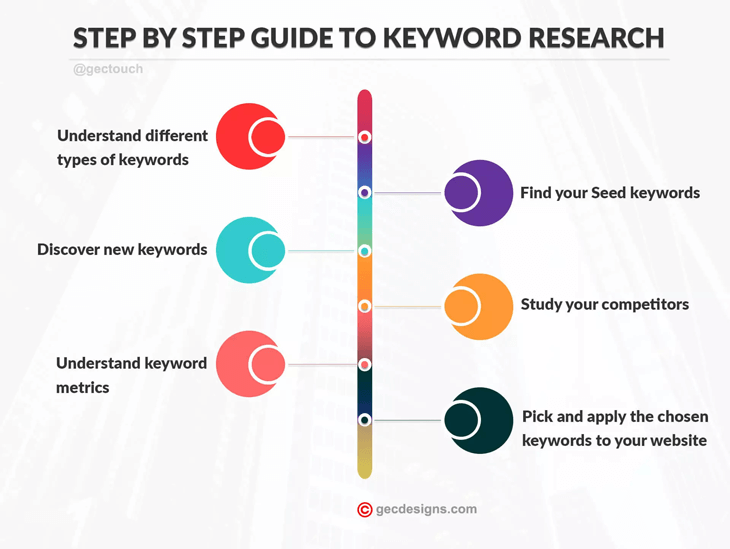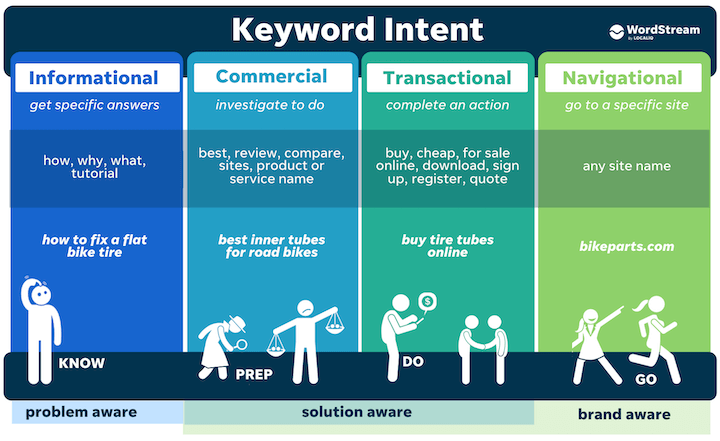Master keyword research with our step-by-step guide. Discover how to optimize your website for SEO and increase organic traffic.

Image courtesy of via DALL-E 3
Table of Contents
Introduction to Keyword Research
Keyword Research is a crucial aspect of Search Engine Optimization (SEO) that helps people find content online through search engines. It involves identifying specific words and phrases, known as keywords or key phrases, that users enter into search engines when looking for information. By understanding how keyword research works, website owners can improve their chances of being found by their target audience.
What is Keyword Research?
Keyword Research is the process of discovering the words and phrases that people commonly use in search engines to find information. Undertaking keyword research allows websites to optimize their content and help it appear in search results when users type in related keywords. By targeting relevant keywords, websites can attract more visitors interested in their content.
Why Do We Need Keywords?
Keywords play a crucial role in helping search engines understand the content of a website. When search engines crawl a webpage, they analyze the keywords present to determine what the page is about. By using the right keywords, website owners can signal to search engines the purpose of their content, increasing the likelihood of their pages appearing in search results for relevant queries.
Step 1: Brainstorming Keywords
Before diving into the world of keyword research, it’s essential to start with a brainstorming session. This step is like planting seeds before they grow into beautiful flowers. Let’s explore how to kickstart your keyword journey.
Think About Your Topic
First, think about what your website or content is all about. Is it about cute puppies, delicious recipes, or exciting travel adventures? Jot down words that come to mind related to your main topic. For example, if you’re writing about healthy snacks, words like “nutritious,” “snacks,” and “recipes” could be good starting points.
Look for Related Words
Next, expand your list by looking for related words. These are words that mean the same thing or are closely connected to your main topic. For instance, if your website is about gardening, words like “plants,” “flowers,” and “landscaping” could be valuable additions to your keyword brainstorming list.
By brainstorming keywords related to your topic, you’re laying a strong foundation for the next steps in keyword research. Remember, the more ideas you brainstorm now, the easier it will be to find the best keywords for your content.
Using Keyword Tools
Now that you’ve brainstormed some keywords, it’s time to explore tools that can help you find the best ones. These tools can show you how often certain words are searched for on the internet. This step will make sure you’re using the most effective keywords to help people find your website.

Image courtesy of texta.ai via Google Images
Google Keyword Planner
One very helpful tool is the Google Keyword Planner. This tool can give you ideas for keywords based on your topic. It also shows you how popular these keywords are. You can see how many people search each month for a specific word or phrase. This information helps you choose the best keywords for your content.
Other Useful Tools
In addition to Google Keyword Planner, there are other tools available to help you find keywords for your website. Tools like Ubersuggest and SEMrush can also provide valuable insights into the search volume of keywords. These tools give you different perspectives and help you make smarter choices when selecting keywords for your content.
Step 3: Analyzing Keywords
After brainstorming and using keyword tools to gather potential keywords, the next step is to analyze their difficulty. Keyword difficulty refers to how hard it is to rank for a specific keyword. If a keyword has high competition, it may be challenging for your website to appear on the first page of search results. On the other hand, keywords with lower competition are easier to rank for.
Search Volume
Another crucial aspect to consider when analyzing keywords is their search volume. Search volume indicates how many people are searching for a particular keyword each month. Choosing keywords with higher search volumes can attract more visitors to your website. However, it’s essential to strike a balance between search volume and competition. Opting for keywords with moderate search volumes and manageable competition can lead to better results.
Step 4: Selecting the Best Keywords
Now that you’ve analyzed different keywords, it’s time to pick the best ones for your website. Remember, choosing the right keywords is crucial for helping your site show up in search results. Let’s dig into how to select the best keywords that will drive traffic to your content!

Image courtesy of www.linkedin.com via Google Images
Long-Tail Keywords
Long-tail keywords are like secret codes that unlock the right content for people searching online. They’re longer phrases that are specific to what your website offers. For example, instead of just “toys,” a long-tail keyword could be “educational wooden toys for toddlers.” These phrases are easier to rank for because they have less competition. Think of long-tail keywords as your secret weapon to reach the right audience!
Short-Tail Keywords
On the other hand, short-tail keywords are like magic spells that bring in a lot of people but can be tricky to master. These keywords are shorter and more general, like “toys.” While they have higher search volumes, they also have fierce competition. It’s important to balance short-tail keywords with long-tail keywords to reach a wider audience while still being specific enough to attract the right visitors.
Step 5: Using Keywords in Content
Once you have selected the best keywords for your website, it’s essential to strategically place them in the content to boost your chances of ranking higher on search engines. Make sure to include your chosen keywords in titles, headings, and throughout the text. By doing this, search engines can better understand what your content is about and show it to people searching for those keywords.
Make It Readable
While keywords are crucial for SEO, it’s equally important to ensure that your content remains easy to read and engaging for your website visitors. Avoid stuffing your text with keywords, as this can make the content sound unnatural and may even turn off your readers. Aim for a balance between incorporating keywords and providing valuable and engaging information to your audience.
Monitoring Keyword Performance
Once you have selected and implemented your chosen keywords into your content, it is essential to monitor their performance. This step involves tracking how well these keywords are working and making adjustments if necessary. By keeping an eye on your keyword performance, you can ensure that your website is effectively reaching its target audience.

Image courtesy of www.wordstream.com via Google Images
Use Analytics Tools
One way to monitor keyword performance is by utilizing analytics tools such as Google Analytics. These tools can provide valuable insights into how visitors are finding your website through specific keywords. By examining this data, you can see which keywords are driving the most traffic and which may need improvement.
Adjust and Improve
Based on the performance data from your analytics tools, it’s important to make adjustments to your keywords as needed. If certain keywords are not performing well, consider replacing them with more effective alternatives. By continuously refining your keyword strategy, you can improve your website’s visibility and attract more visitors.
Conclusion
In conclusion, keyword research plays a crucial role in the success of Search Engine Optimization (SEO). By following the steps outlined in this manual, you can effectively improve your website’s visibility and attract more visitors. Remember, good keyword research is the key to achieving SEO success.
By understanding what keywords are and how they help search engines connect people with relevant content, you can create a strong foundation for your website. Brainstorming keywords, using tools to find the best ones, analyzing their performance, and selecting the most suitable keywords are all essential steps in the keyword research process.
Once you have chosen the best keywords, incorporating them naturally into your content is vital. Ensure that your content remains engaging and informative while utilizing the selected keywords strategically. Monitoring keyword performance and making necessary adjustments based on analytics data will help you continuously improve your SEO efforts.
By consistently applying these keyword research techniques and staying updated with the latest trends, you can enhance your website’s visibility, attract more visitors, and ultimately achieve greater success in the competitive online landscape. Remember, keyword research is an ongoing process that requires dedication and strategic thinking to yield positive results.
Want to turn these SEO insights into real results? Seorocket is an all-in-one AI SEO solution that uses the power of AI to analyze your competition and craft high-ranking content.
Seorocket offers a suite of powerful tools, including a Keyword Researcher to find the most profitable keywords, an AI Writer to generate unique and Google-friendly content, and an Automatic Publisher to schedule and publish your content directly to your website. Plus, you’ll get real-time performance tracking so you can see exactly what’s working and make adjustments as needed.
Stop just reading about SEO – take action with Seorocket and skyrocket your search rankings today. Sign up for a free trial and see the difference Seorocket can make for your website!
FAQs
What are Long-Tail Keywords?
Long-tail keywords are like special hidden codes that help search engines find exactly what you’re looking for. They’re longer phrases that are super specific, making it easier for your website to show up when someone searches for something very particular. Think of it as finding a purple unicorn in a sea of horses – the more unique the keyword, the better chance your website has to shine!
Why Can’t I Use Only Popular Keywords?
Imagine if everyone at a party wore the same shiny red shoes – it would be hard to stand out, right? Popular keywords are like those red shoes; lots of people use them, so it’s tough to get noticed. By mixing in less common keywords, you give your website a better chance to catch people’s attention. It’s all about finding the right balance to make sure your website stands out in the crowd!
How Often Should I Check Keyword Performance?
Checking how well your keywords are doing is like keeping an eye on your garden to see if your plants need water or sunshine. It’s good to peek at your keyword performance every now and then, maybe once a month, to see if they’re helping your website grow. If you notice some keywords aren’t doing their job, you can make changes to help your website bloom even more!







